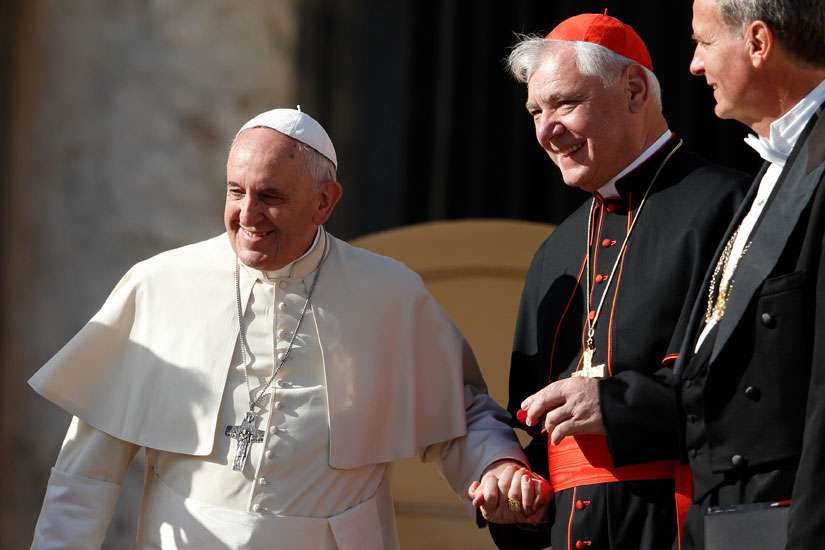"The Church cannot understand itself or justify itself in the world's eyes according to standards of power, wealth or prestige," said the prefect, Cardinal Gerhard Muller. "The reflection on the nature and mission of the Church of God is, therefore, the basis and presupposition of every true reform."
As Pope Francis' international Council of Cardinals prepared to meet Feb. 9-11 to discuss the reform of the Roman Curia and the world's cardinals were set to discuss the council's proposals Feb. 12-13, the Vatican newspaper published a long piece by Muller on "theological criteria for a reform of the Church and the Roman Curia."
While the Church's mission is to be a sacrament of holiness and help people reach heaven, it must do so on Earth, which requires a structure and organization, he wrote in the article published in the Feb. 8 edition of L'Osservatore Romano.
The Roman Curia, he wrote, is not an "intermediary between the Pope and the bishops, because the relationship between the pontiff and bishops, based on episcopal collegiality, is immediate."
The cardinals and bishops of the Roman Curia, he said, are simply called to "support the Pope in his service for Catholic unity and they place at his disposition all the appropriate and necessary means for exercising his pastoral and doctrinal office."
When the Pope and cardinals believe the Curia is no longer fulfilling that function, it is time for change. After Pope Benedict XVI's resignation in February 2013, Muller wrote, the world's cardinals discussed the situation and agreed that reforming the Curia should be a priority for the new Pope.
"The reform of the Roman Curia, discussed in the congregations preceding the conclave of 2013, must be the exemplar for the spiritual renewal of the whole Church," he wrote.
Pope Francis' speech to leaders of the Curia in December, a speech in which the Pope listed 15 spiritual "diseases" that can afflict Church bodies, "underlined the absolute priority of the spiritual aims of the Church over every earthly means," the cardinal wrote. "This speech was a spiritual exhortation and an examination of conscience for the whole Church."
The heads of the offices of the Roman Curia are appointed to advise the Pope and carry out his decisions for the good of the unity of the Church, he said. It is different from the Synod of Bishops, which, with the Pope and under his leadership, is a sign of the universality of the Church.
"Promoting a correct decentralization" of the Church's administrative structures, he said, "does not mean giving more power to bishops' conferences," but allowing them to "exercise the genuine responsibility they have based on their members' episcopal power of teaching and governance, naturally always in union with the primacy of the Pope and the Roman Church."
"A true reform of the Roman Curia and of the Church," Muller wrote, "has the objective of making the mission of the Pope and of the Church in the world of today and tomorrow shine more brightly."
People of faith face growing secularism around the world, an attitude that God is not a necessary point of reference for meaning or action, he said. "The boundaries between truth and lies, between good and evil are blurring. The challenge for the hierarchy and for all members of the Church lies in resisting these worldly infections and curing the spiritual maladies of our time."
"Pope Francis is promoting a spiritual purification of the temple, which is both painful and liberating, with the aim of making the glory of God, light of all, shine again in the Church," the cardinal wrote.


